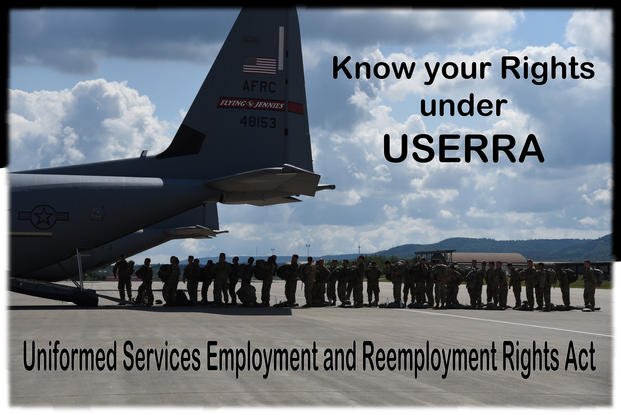Mark Stodola had a good job supervising about 18 people in the material-handling department at a manufacturing company in Wisconsin -- until he was called to active Air Force duty in the wake of the Sept. 11 attacks.
As a squad leader for the Air Force Reserve, Stodola had been all over the world in his 15-year military career, including Germany, England, Puerto Rico, Panama and Norway. But those were usually for periods of two weeks to two months, nothing compared with his nearly two years on active duty from September 2001 to August 2003, when he was stationed at his unit's base at the Minneapolis-St. Paul International Airport. When his active duty ended, Stodola still had a job, but his seniority, scheduled pay increase and status with the company had changed.
"They were very supportive of me throughout my time on active duty, and I constantly kept them updated on my situation, status and schedule," Stodola said. "But when I came back to work to talk about my pay increase, it was a big negative."
Making matters worse, Stodola found out he had a new boss who was taking over his supervisory duties, an apparent violation of the Uniformed Services Employment and Reemployment Rights Act (USERRA), which states that employers must reinstate permanent employees returning from active duty to their former positions or comparable positions of like status, seniority and pay.
USERRA: Making Things Right
"Things were never right when I got back," Stodola said. "They were never the same. I could tell that from Day 1."
And that's illegal, says Ryan Wedlund, an attorney who is also senior ombudsman for the Minneapolis branch of ESGR, the National Committee for Employer Support of the Guard and Reserve, which acts as a watchdog for military personnel rights in the workplace. Wedlund helped Stodola work out the issues he had with his employer, writing letters to the company on his behalf, threatening legal action and explaining the laws governing situations like his.
"If someone leaves an employer because they are called to active duty, they need to be credited seniority and pay as if they never left," Wedlund said. "Those are the laws clearly stated in USERRA."
But it wasn't until January 2004 that Stodola received back pay for the raise he never got, and he left the company shortly after it took away his supervisory duties.
Gray Areas of the Law
Stodola's case illustrates the plight of many returning military personnel. Wedlund says one Midwest doctor was fighting for back pay from a major hospital. Sixty percent of the doctor's salary was straight pay, while the rest was based on patient load. Because he was overseas in the military, his patient load was zero, and the hospital claimed it did not have to pay the remaining 40%.
"This guy had his load increase each of the seven years he worked at the hospital," Wedlund said. "That's a real gray area that USERRA doesn't quite explain. You can't make a law fit every possible employment situation, and that's why this case is so tricky. However, because he is out on military leave, he should be credited for a patient load by taking the average of the patients he had in his seven years at the hospital."
Unions Afford Protection
Pete Gilmore, managing editor of the Pittsburgh-based UE News, the official newspaper of the United Electrical, Radio and Machine Workers of America (UEW), says union regulations have helped minimize cases like Stodola's with UEW employers.
"It's clearly written out within contracts what the rights of the employee are if called to active duty," Gilmore said. "Because most nonunion employers are considered at-will employers, they might not have this in writing, which could then lead to the problems some are facing."
As for Stodola, he has taken a new job working as a security supervisor at his Air Force base in Minneapolis. But getting back to the life he knew has been difficult.
"I know a lot of guys are going through it," Stodola said. "It's a different life that takes time to adjust to."
Find the Right Veteran Job
Whether you want to polish your resume, find veteran job fairs in your area or connect with employers looking to hire veterans, Military.com can help. Sign up for a free Military.com membership to have job postings, guides and advice, and more delivered directly to your inbox.











